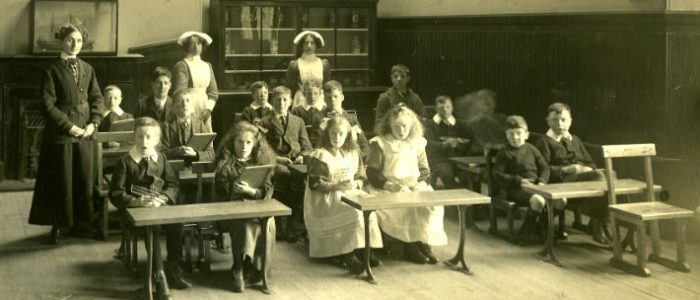Hospital Archive Gets UNESCO Status
PHOTOGRAPHS and papers from the early days of the Royal Scottish National Hospital in Larbert have been recognised as of outstanding historical importance by the United Nations’ cultural body, UNESCO.
The hospital archive – now in the care of the University of Stirling’s Archives – have been added to the UNESCO UK Memory of the World Register – an online catalogue created to help promote the UK’s documentary heritage across the UK and the world.
Access the register at www.unesco.org.uk/ukregister
Karl Magee, the University Archivist, said: “Every year only a small select group of collections are added to the UK UNESCO Register. This year there have only been 11 additions – including the archives from the hospital, the famous Domesday book and the silent movie collection of Alfred Hitchcock.
“It’s a real honour to be included as it recognises our archive is of outstanding national importance.”
He added: “Hopefully this endorsement by UNESCO – showing the importance of the RSNH archive – will raise awareness of the material we hold and encourage more people to explore the University archives.”
Established in 1862, the Royal Scottish National Institution – later the Royal Scottish National Hospital (or RSNH) – was the foremost hospital providing custodial care for mentally impaired children in Scotland in the 19th and 20th centuries.
It gained an international reputation for its enlightened approach to care and treatment attracting patients from England and across the British Empire.
Mr Magee said: “The extensive archives of the institution which survive provide a comprehensive record of the management and operation of the hospital. Of particular note is the large collection of over three thousand application forms for admission to the institution.
“These documents provide a wealth of information about children from all across Scotland who required treatment and care; the lives of their parents and families; and the figures in their local communities who supported their applications.
“The stories of these children are recorded in the case notes and other hospital records which document their treatment and care.
“Unsuccessful applications were also retained by the institution resulting in an archive which provides a wider historical picture of the mental health of children across Scotland. The records of the hospital provide a valuable new resource for the study of the history of medicine and society in Scotland.
“It is also a hitherto untapped genealogical resource for families all across Scotland and further afield, its records containing the stories of forgotten or hidden members of families who relatives today are keen to re-discover.”
The Hospital closed as a national resource in 2002, as the emphasis shifted towards caring for people in the community – in either supported accommodation or, in many cases, in their own homes. Part of the site is now occupied by the new Forth Valley Royal Hospital.
The RSNH archives form a part of a large collection of historical material which was recently transferred to the University Archives by NHS Forth Valley.
NHS Forth Valley Chief Executive Professor Fiona Mackenzie said: “I am delighted to hear that the fine work carried out by the Royal Scottish National Hospital has been considered worthy of recognition by UNESCO. Throughout the nineteenth and twentieth centuries the hospital challenged prejudice and influenced social change. Queen Victoria became one of its influential patrons, and ‘Royal’ was added to its name.
“There is no doubt that the hospital was a trailblazer and its legacy is one of care and compassion. Although now demolished, and the site of the new Forth Valley Royal Hospital, its memories live on, and it is still held in affection both by NHS Forth Valley staff and the local community.”
The 11 additions to the UNESCO UK Memory of the World Register were announced at an event on Tuesday (July 9). UNESCO said they were selected from the from the UK’s libraries, archives and museums to “represent the outstanding heritage of the United Kingdom”.
David Dawson, Chair of the UK Memory of the World Committee, said: “This year’s inscriptions reflect the richness of UK culture and history, from medieval manuscripts to ground breaking cinema. We hope that today’s announcement will encourage people to discover these items and collections, as well as some of the other great documentary heritage near them.”
Tim Williams, Deputy Chair of UNESCO’s UK National Commission said, “We’re pleased to welcome these UK museums, libraries and archives into the UNESCO family through the Memory of the World programme. These range from some of the UK’s largest, national-level institutions, to local records offices. Regardless of their size, this designation is an important recognition of some of the outstanding heritage they hold.”
The UK Memory of the World programme is part of UNESCO’s work to promote preservation of and access to the world’s archive holdings and library collections.
You can find out more about the University’s Archives at http://libguides.stir.ac.uk/archives
The archives are open to university staff and students, researchers and members of the public, with the collections covering a wide range of subjects including history and politics, literature, film and media, and sport. Members of the public are asked to contact the Archives in advance of a visit. Call 01786 466619 or email: archives@stir.ac.uk





